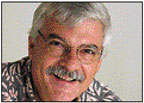Shift in Congress should boost Hawaii
Three of the state's four lawmakers will hold important posts
With new faces, big promises and more Democrats, the 110th Congress is open for business.
For the first time, Hawaii's four-person congressional team, all Democrats, will have three members running influential panels.
That is because for the first time in 12 years, the Democrats are in control of both houses of Congress, and Hawaii is likely to reap more political power.

ON ASSIGNMENT
Honolulu Star-Bulletin Capitol Bureau Chief Richard Borreca will be filing reports from Washington, D.C., all this week on Hawaii's congressional delegation as the new Democratic majority in Congress takes power.
|
Only newcomer Rep. Mazie Hirono, who will have a seat on the Transportation Committee, is without a chair.
Rep. Neil Abercrombie, who has served in congress for 16 years, will be chairman of a subcommittee of the House Armed Services Committee. According to a spokesman for Abercrombie, the congressman will be in charge of the Army and Air Force for the House.
Sen. Dan Akaka, who has served 16 years in the Senate and 14 years in the House, will head the Senate Veterans Affairs Committee. Akaka served as the top Democrat on the committee when it was run by the Republicans. He has been actively involved in improving the nation's care for veterans returning from the Iraq war.
Sen. Dan Inouye, who started representing Hawaii in Washington when Hawaii became a state in 1959, will run the Defense subcommittee of the Senate Appropriations Committee and will chair the Commerce, Science and Transportation Committee.
Already the new Democratic leadership in the House is trumpeting the reforms that are being passed. New House Speaker Nancy Pelosi, D-Calif., and Majority Leader Steny Hoyer, D-Md., want to reduce federal spending.
One way is to reduce the ability of individual members of Congress to slip into the various budget bills money for projects in their home district.
The process is called "earmarking," and while it raises concerns on a national level, on the local level it is an important way for federal dollars to come into small states, such as Hawaii.
"Hawaii today gets more than its per capita share of tax dollars, in part thanks to Dan Inouye," said state Senate President Colleen Hanabusa. "The ability to earmark and what Sen. Inouye has done for the state is critical for us."
Inouye accepts that he has been called "the King of Pork" on Capitol Hill, but says he can defend any project that he has put in the budget.
"I get criticized and insulted sometimes for being called Mr. Pork, but I am proud to be called Mr. Pork -- at least it shows I am working," Inouye said in an interview last week.
Projects ranging from the funding of the East-West Center to stopping Guam's brown tree snake from slipping into Hawaii have benefited from Inouye earmarks.
While the House Democrats are eager to show the nation what Democrats can do in Congress, Inouye stresses the need for bipartisanship, saying, "It would be best to keep it low-key."
"I have been telling my colleagues on the Democratic side that we won't be celebrating now that Americans have come to their senses ... it is counterproductive to fight, unless that is the headline you want," Inouye said.
He pointed to his own relationship with Alaska Republican Ted Stevens. When the GOP was running Congress, Inouye served as co-chairman of the powerful Commerce Committee when Stevens was chairman.
"It is going to be an exciting year and it will take a cool head and careful management. We better learn to count to 10 before we start yelling," Inouye advised.
Inouye's work on the Commerce Committee is already expected to be vital for Hawaii.
Honolulu Mayor Mufi Hannemann says he is hoping Inouye will be able to both steer more federal money to the city mass transit project, estimated to cost up to $6 billion, and help with a planned ferry system.
For Inouye, however, the requests for funding can wait until Congress takes action to resolve the Iraq war.
"The resolution of the Iraq problem takes precedence. The money for the war just eats up everything. Right now the war is costing us nearly $10 billion a month," Inouye said.
Inouye suggests that the United States sponsor some sort of a plebiscite or referendum in Iraq to find out whether the American presence is wanted. If the sentiment is against the United States remaining, Inouye said, it would give the Congress and President Bush reason to start an orderly withdrawal from the country.

